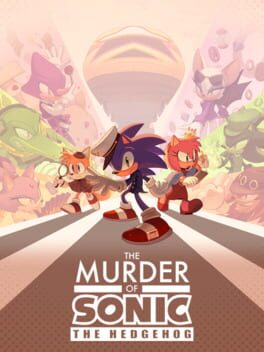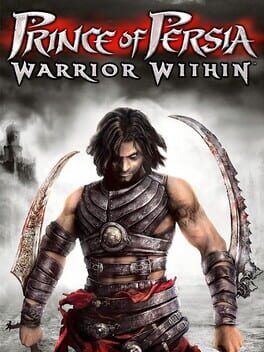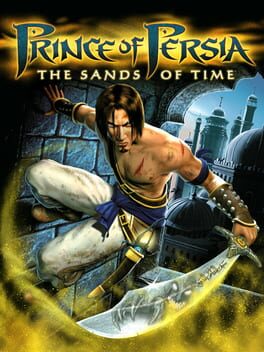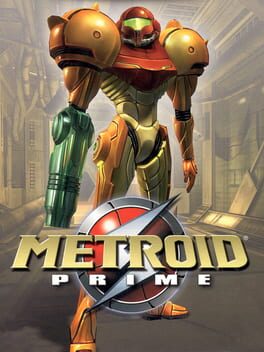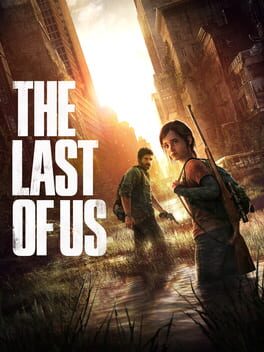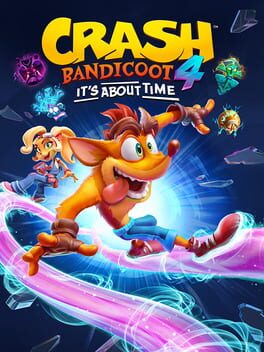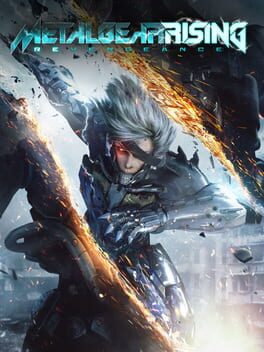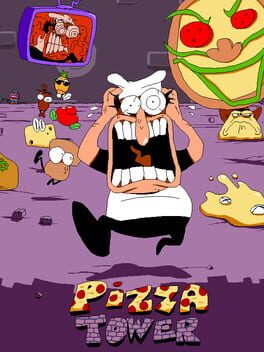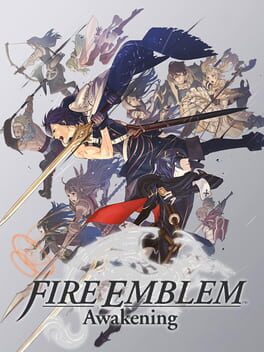Gerborious
2005
Smells like cigarette smoke and cheap alcohol. Deadly amounts of edge, actively making the experience anti-charismatic. The combat has more "depth", but entirely for the worse. It's fine when you are allowed to platform around, until you are required to redo segments multiple times. Quit during the final boss when I realized that there wasn't anything else in the game that I would likely enjoy.
2023
I am completely on board for more remakes that are both completely distinct from the original, and equally excellent. I get being disappointed with certain aspects being removed, but at the same time I love what they added and remixed here. Can't believe I'm going to have to choose between two RE4s to replay for the rest of my life, woe is me.
Prince of Persia: The Sands of Time is without question one of the most influential platformers ever made. It's easy to trace its legacy during play. Moments where ledges fall away, revealing a specific path for the Prince to climb on, or removing pieces of scaffolding that the player balances on have been redone again and again and again. Uncharted, God of War, Tomb Raider, Jedi: Fallen Order, and many more all follow in the example that this game set, if in an extremely diluted way. So, does this original version stand up to the test of time? I would say it does fairly well.
What The Sands of Time has over most modern instances of this style is obscuration. While the Prince is much more agile than say, Nathan Drake, I think this aspect of the level design is much more active in creating engaging platforming. This is a puzzle platformer in a literal sense, where the button combinations and reaction times are pretty lenient, so the challenge is derived from pathfinding. The best parts of The Sands of Time are when it crafts a fully realized puzzle box of platforming. Spaces that are well realized enough to facilitate a sense of place, alongside engaging the player in solving the path forward. Ropes, columns, ledges, saws, beams, and more are dotted around rooms, and the player's job is to string these separate elements together into a traversable path. It helps, of course, that the contextual tools the player does have are satisfying to pull off.
As mentioned before, The Sands of Time is a pretty relaxed game in terms of the platforming. It could use some development, but it's a really good base to work off of, and if it was the only aspect of The Sands of Time I would probably be able to heartily recommend it. Luckily, the combat of this game is here to save the day! I get why it exists, this is a tale of swashbuckling adventure! White knuckle platforming, and acrobatic life or death combat! Unfortunately, the mechanics aren't up to snuff.
So, every once in a while, usually after an extended platforming section, the game will throw you into a combat arena. Usually, there are a few enemies idling, but stealth isn't an option. Unlike other games, you can't just defeat the enemies by dealing enough damage. You need to knock them down with standard attacks, before absorbing them into your knife, which is a prolonged animation. You have a button to attack, another to use the knife, the jump now vaults the Prince over an enemy or off a wall, and there are a few special techniques that take resources. It sounds good on paper, a simple combat system to act as a nice buffer between sections of the real meat of the game, but combat scenarios feel long, tedious, and unbalanced. The only impactful difference between enemies is that some punish the Prince for attempting to vault over them. Because the Prince selects which enemy to target on his own, I got game overs numerous times when he decided to absorb an enemy instead of freezing another. The time rewind mechanic has a strange restriction in combat, where defeating an enemy resets the clock. So if an enemy starts an attack while you are absorbing another, and you are able to finish, you take unavoidable damage from the Prince's lengthy recovery frames. Sometimes certain moves don't seem to work, your companion is actively unhelpful, and the camera feels the need to give the player as little helpful information as possible. All of this combines into one of the least enjoyable combat systems I have played in a long time.
I don't want to end this on a negative note. I really did enjoy my time overall with The Sands of Time. Yes, the combat is not good, and the story isn't anything worth talking about (The Prince is straight up misogynistic, the guy literally at one point says the female lead needs to learn her place and he needs to conquer her it's weird), but it does have a good base to work off of. I am excited to see where the series goes from here. Even if the sequel looks entirely unappealing.
What The Sands of Time has over most modern instances of this style is obscuration. While the Prince is much more agile than say, Nathan Drake, I think this aspect of the level design is much more active in creating engaging platforming. This is a puzzle platformer in a literal sense, where the button combinations and reaction times are pretty lenient, so the challenge is derived from pathfinding. The best parts of The Sands of Time are when it crafts a fully realized puzzle box of platforming. Spaces that are well realized enough to facilitate a sense of place, alongside engaging the player in solving the path forward. Ropes, columns, ledges, saws, beams, and more are dotted around rooms, and the player's job is to string these separate elements together into a traversable path. It helps, of course, that the contextual tools the player does have are satisfying to pull off.
As mentioned before, The Sands of Time is a pretty relaxed game in terms of the platforming. It could use some development, but it's a really good base to work off of, and if it was the only aspect of The Sands of Time I would probably be able to heartily recommend it. Luckily, the combat of this game is here to save the day! I get why it exists, this is a tale of swashbuckling adventure! White knuckle platforming, and acrobatic life or death combat! Unfortunately, the mechanics aren't up to snuff.
So, every once in a while, usually after an extended platforming section, the game will throw you into a combat arena. Usually, there are a few enemies idling, but stealth isn't an option. Unlike other games, you can't just defeat the enemies by dealing enough damage. You need to knock them down with standard attacks, before absorbing them into your knife, which is a prolonged animation. You have a button to attack, another to use the knife, the jump now vaults the Prince over an enemy or off a wall, and there are a few special techniques that take resources. It sounds good on paper, a simple combat system to act as a nice buffer between sections of the real meat of the game, but combat scenarios feel long, tedious, and unbalanced. The only impactful difference between enemies is that some punish the Prince for attempting to vault over them. Because the Prince selects which enemy to target on his own, I got game overs numerous times when he decided to absorb an enemy instead of freezing another. The time rewind mechanic has a strange restriction in combat, where defeating an enemy resets the clock. So if an enemy starts an attack while you are absorbing another, and you are able to finish, you take unavoidable damage from the Prince's lengthy recovery frames. Sometimes certain moves don't seem to work, your companion is actively unhelpful, and the camera feels the need to give the player as little helpful information as possible. All of this combines into one of the least enjoyable combat systems I have played in a long time.
I don't want to end this on a negative note. I really did enjoy my time overall with The Sands of Time. Yes, the combat is not good, and the story isn't anything worth talking about (The Prince is straight up misogynistic, the guy literally at one point says the female lead needs to learn her place and he needs to conquer her it's weird), but it does have a good base to work off of. I am excited to see where the series goes from here. Even if the sequel looks entirely unappealing.
2002
This sounds stupid, but the biggest thing that Metroid Prime lacks in is progression. Maybe I should say palpable progression? Let me try to explain.
Frankly, the movement in Metroid Prime blows. The double jump is good, but the rest is pretty middling. One of my favorite parts of these types of games is conquering the map through advanced movement. In Metroid Prime, all you really get is the ability to cross larger gaps. This is good, but I wish it was pushed further. The Boost Ball is also there? Hooray?
Another big aspect of Prime's underwhelming progression are the boss fights. They are so extremely lame it hurts. The designs are so cool I just wish they were 60% shorter and 90% less repetitive and 40% more aggressive. It doesn't feel good to explore, and find mostly combat related upgrades, only for their application to be utterly banal. Why should I care about finding missiles when I know that every time I hit Meta Ridley with one, he'll just go into a canned 20 second flight animation, sometimes multiple times in a row?
Finally, while the map design on a micro level is immaculate in both visual and level design, on a macro level it falls apart quick. Look, the big issue is Magmoor ok? I feel like so much of my time was spent walking back and forth through that same linear part of the map. Admittedly, this could be more due to me being unfamiliar with the optimal routes to pickup upgrades, so this could get better with more playthroughs.
This game has acted as a sort of mental block for me since I finished it last month. Once my life opens up, and I finish the other games I'm currently playing through, I plan on going back and doing a complete new game plus, hard mode playthrough. Consider this a rough draft of my opinions.
Frankly, the movement in Metroid Prime blows. The double jump is good, but the rest is pretty middling. One of my favorite parts of these types of games is conquering the map through advanced movement. In Metroid Prime, all you really get is the ability to cross larger gaps. This is good, but I wish it was pushed further. The Boost Ball is also there? Hooray?
Another big aspect of Prime's underwhelming progression are the boss fights. They are so extremely lame it hurts. The designs are so cool I just wish they were 60% shorter and 90% less repetitive and 40% more aggressive. It doesn't feel good to explore, and find mostly combat related upgrades, only for their application to be utterly banal. Why should I care about finding missiles when I know that every time I hit Meta Ridley with one, he'll just go into a canned 20 second flight animation, sometimes multiple times in a row?
Finally, while the map design on a micro level is immaculate in both visual and level design, on a macro level it falls apart quick. Look, the big issue is Magmoor ok? I feel like so much of my time was spent walking back and forth through that same linear part of the map. Admittedly, this could be more due to me being unfamiliar with the optimal routes to pickup upgrades, so this could get better with more playthroughs.
This game has acted as a sort of mental block for me since I finished it last month. Once my life opens up, and I finish the other games I'm currently playing through, I plan on going back and doing a complete new game plus, hard mode playthrough. Consider this a rough draft of my opinions.
2013
A good game shackled by the reputation of being a masterpiece, or being the profane icon of the medium's worst generation. While the story is simple, I appreciate it most when it focuses on sympathetic characters and their growing relationships. The ending especially works off this; turning what should be an unambiguous turn to evil into something I honestly understood the reasoning for. The gameplay is much the same way, a simple third-person shooter that shines when utilizing its unique mechanics. I only wish I was pushed to scavenge and craft during combat more, because it's really engaging in a firefight.
Also, Resident Evil 4 is just as "cinematic" as this game but people aren't ready for that conversation
2015
Another day, another review talking about how this is their first Yakuza game. Guess what? It's really great! I want to talk about it some more, so hopefully this gets more original from here on out.
Yakuza 0's greatest asset is its story. The acting is phenomenal, and the drama can be extremely compelling. This is especially true in the back half of the game, when events really begin to kick into motion. However, this came with the unfortunate effect that past say, chapter 10 or so, I just stopped doing any side content. At a certain point, the substories became too repetitive, and the minigames lost their luster. This was my biggest disappointment from the game. So much of Yakuza's publicity is surrounding these side activities, and while I don't regret spending the time I did screwing around in the early game, I don't have any desire to go back and see what I missed.
In many ways, this has to do with how I feel about the game's other main aspect, its combat. It's fine. I guess. I played on hard, but the game never got very mechanically challenging. Most of the time the combat is fun because of spectacle, this is especially true of boss fights. I'm honestly having a hard time determining why I feel so middling on the combat. In theory everything is there, so what is the missing link? It may have something to do with the enemy design. Enemies are split between being mindless pushovers, or having absurd defensive capabilities. I'm left wondering if some of the bosses had literally infinite super armor, or my damage output was pitifully low from being on hard mode.
Finally, I want to end on something I really enjoyed about Yakuza 0. I feel like I've been primarily negative so far, but I overall really liked the game, so I want to reflect that. What I loved the most about Yakuza 0 is its commitment. In every possible aspect of the game, down to the smallest minigame, it goes the extra mile. It treats every aspect with the same level of engagement, nothing truly feels like leftover side content. What a great time overall, maybe in the end it was just too long for its own good? Eh, who knows.
Yakuza 0's greatest asset is its story. The acting is phenomenal, and the drama can be extremely compelling. This is especially true in the back half of the game, when events really begin to kick into motion. However, this came with the unfortunate effect that past say, chapter 10 or so, I just stopped doing any side content. At a certain point, the substories became too repetitive, and the minigames lost their luster. This was my biggest disappointment from the game. So much of Yakuza's publicity is surrounding these side activities, and while I don't regret spending the time I did screwing around in the early game, I don't have any desire to go back and see what I missed.
In many ways, this has to do with how I feel about the game's other main aspect, its combat. It's fine. I guess. I played on hard, but the game never got very mechanically challenging. Most of the time the combat is fun because of spectacle, this is especially true of boss fights. I'm honestly having a hard time determining why I feel so middling on the combat. In theory everything is there, so what is the missing link? It may have something to do with the enemy design. Enemies are split between being mindless pushovers, or having absurd defensive capabilities. I'm left wondering if some of the bosses had literally infinite super armor, or my damage output was pitifully low from being on hard mode.
Finally, I want to end on something I really enjoyed about Yakuza 0. I feel like I've been primarily negative so far, but I overall really liked the game, so I want to reflect that. What I loved the most about Yakuza 0 is its commitment. In every possible aspect of the game, down to the smallest minigame, it goes the extra mile. It treats every aspect with the same level of engagement, nothing truly feels like leftover side content. What a great time overall, maybe in the end it was just too long for its own good? Eh, who knows.
Absolutely insane how every time a new team brings an old platforming series out of the vault they manage to make one of, if not the best game in their respective series. First there was Donkey Kong Country, then Rayman, and now Crash.
Crash 4 gets as close to a 3D precision platformer as a mainstream title is likely ever going to get. I doubt that Nintendo would ever dare to try, and Sonic has gone open zone at this point, so that ship has sailed. Such an undertaking, no matter how well done it is, has some rough edges. Crash 4 is tight, definitely more consistent than the N.Sane Trilogy, but when the game asks for perfect precision, this just doesn't hold up. Additionally, the game could remove at least a few crates every level and be better off for it. Once the player knows to check behind walls, or above every stack of crates it's no longer an interesting secret. Especially when it's repeated so often.
The additional gimmicks are all pretty good! Aside from Tawna funnily enough, because of her similarities she just ends up feeling like a less engaging version of the core gameplay. Also, while Cortex and Dingodile are both fun, some of their levels are absurdly short. I know it isn't possible to divide game development like this, but I would've preferred the alternate timeline stages be cut entirely, and each character get an additional, entirely unique stage instead.
What I'm left with is a sense of expectation. I firmly believe that if this team got one more shot at making a sequel, we wouldn't just have the best Crash game on our hands, we would have one of the best platformers ever made. Donkey Kong and Rayman both had that opportunity, why not Crash?
Crash 4 gets as close to a 3D precision platformer as a mainstream title is likely ever going to get. I doubt that Nintendo would ever dare to try, and Sonic has gone open zone at this point, so that ship has sailed. Such an undertaking, no matter how well done it is, has some rough edges. Crash 4 is tight, definitely more consistent than the N.Sane Trilogy, but when the game asks for perfect precision, this just doesn't hold up. Additionally, the game could remove at least a few crates every level and be better off for it. Once the player knows to check behind walls, or above every stack of crates it's no longer an interesting secret. Especially when it's repeated so often.
The additional gimmicks are all pretty good! Aside from Tawna funnily enough, because of her similarities she just ends up feeling like a less engaging version of the core gameplay. Also, while Cortex and Dingodile are both fun, some of their levels are absurdly short. I know it isn't possible to divide game development like this, but I would've preferred the alternate timeline stages be cut entirely, and each character get an additional, entirely unique stage instead.
What I'm left with is a sense of expectation. I firmly believe that if this team got one more shot at making a sequel, we wouldn't just have the best Crash game on our hands, we would have one of the best platformers ever made. Donkey Kong and Rayman both had that opportunity, why not Crash?
After years of waiting and hours spent playing the games leading up to it, I finally got to play Metal Gear Rising. Honestly, I thought it would be better? There is a great action game in here, but a couple of factors I found lacking.
Firstly, I was really underwhelmed by the level design. Aesthetically, they are very 7th gen; gray and brown are the primary color palette. There are breaks from this, (the Japanese garden) and there are times where it works, (the dusty highway duel between Raiden and Sam) but the locations of this game have already begun to slip from my mind. It doesn't help that the levels are very simple mechanically. Rising is a very pared back Platinum game, and this may be a benefit for many people. Personally, the moments of brief puzzles, platforming, or minigames really add to an action game for me. The lower intensity moments help add to the electrifying combat. Rising does have brief moments where it lets the player look for collectables, but the campaign is laser focused on the core combat.
Speaking of said combat. It's solid, but there are things I found disappointing. The biggest issue for me is the menu system. Not every game needs to be Devil May Cry, and have every option available all at once, but the secondary weapons you can switch to are underwhelming. Mistral's staff is great, but Monsoon's sai and Sundowner's blades both felt disappointing. The sai really is the most sad piece of this. If there was a way to quickly swap I would be using it all the time, but giving up over half of your combo list for a tether just didn't feel worthwhile. Luckily, Raiden's parry and Zandatsu both feel great to pull off through the entire game. I think what I was most disappointed with were the enemies. Rising is one of those unfortunate action games where a lot of the more unique foes weren't fun to fight. Especially when it comes to projectiles. On the other side of the coin, the bosses were consistently fantastic! The music is energetic, and learning their combos were really fun.
One final thing to touch on, and it's the story. Rising's story has been absolutely regurgitated through memes. It's still fun, but I think certain moments lost their impact on me. The game is also extremely short? Even for one of these games it's really thin.
Overall it gets a thumbs up from me. It's a pretty middle of the road Metal Gear game, and a middle of the road Platinum game. Funny how that works out.
Firstly, I was really underwhelmed by the level design. Aesthetically, they are very 7th gen; gray and brown are the primary color palette. There are breaks from this, (the Japanese garden) and there are times where it works, (the dusty highway duel between Raiden and Sam) but the locations of this game have already begun to slip from my mind. It doesn't help that the levels are very simple mechanically. Rising is a very pared back Platinum game, and this may be a benefit for many people. Personally, the moments of brief puzzles, platforming, or minigames really add to an action game for me. The lower intensity moments help add to the electrifying combat. Rising does have brief moments where it lets the player look for collectables, but the campaign is laser focused on the core combat.
Speaking of said combat. It's solid, but there are things I found disappointing. The biggest issue for me is the menu system. Not every game needs to be Devil May Cry, and have every option available all at once, but the secondary weapons you can switch to are underwhelming. Mistral's staff is great, but Monsoon's sai and Sundowner's blades both felt disappointing. The sai really is the most sad piece of this. If there was a way to quickly swap I would be using it all the time, but giving up over half of your combo list for a tether just didn't feel worthwhile. Luckily, Raiden's parry and Zandatsu both feel great to pull off through the entire game. I think what I was most disappointed with were the enemies. Rising is one of those unfortunate action games where a lot of the more unique foes weren't fun to fight. Especially when it comes to projectiles. On the other side of the coin, the bosses were consistently fantastic! The music is energetic, and learning their combos were really fun.
One final thing to touch on, and it's the story. Rising's story has been absolutely regurgitated through memes. It's still fun, but I think certain moments lost their impact on me. The game is also extremely short? Even for one of these games it's really thin.
Overall it gets a thumbs up from me. It's a pretty middle of the road Metal Gear game, and a middle of the road Platinum game. Funny how that works out.
This review contains spoilers
Metal Gear Solid 4 is extremely sad. It's a story of a man who was manufactured to fulfil a role he doesn't understand, pushing himself further and further past his limit to the edge of death. I really like this, it felt entirely unique to the rest of the series. Certain cutscenes can feel genuinely hard to watch, especially as Snake's condition deteriorates.
This is why I found the final epilogue so disappointing. Big Boss shows up! The entirety of the story was his plan! Turns out Foxdie isn't going to be a problem anymore! In attempting to tie everything together in one neat bow, Kojima managed to have the opposite effect. Maybe I will warm to this over time, but it left me feeling unsatisfied in the moment.
This is why I found the final epilogue so disappointing. Big Boss shows up! The entirety of the story was his plan! Turns out Foxdie isn't going to be a problem anymore! In attempting to tie everything together in one neat bow, Kojima managed to have the opposite effect. Maybe I will warm to this over time, but it left me feeling unsatisfied in the moment.
2023
From pause combos in Devil May Cry, to the parry sequences in Sekiro, rhythm has always been an integral part of action games. What hides this fact is that while the rhythm has always been there, it's typically unfocused. Bayonetta may be dancing to one beat, but the enemies are marching to one of their own, and the ost is going to an entirely different bpm. Action games have always been rhythm games, in the same way that the members of an orchestra all tuning their instruments disparately is still music.
This is what makes Hi-Fi Rush so brilliant. It realizes that the only missing piece keeping these games from being recognized as musical is a consistent beat. The player, enemies, music, stages, and cutscenes, everything is in sync.
It helps that the game is killer too, Chai's combos are slick and weave well into each other. The game has a strong set of enemies, and the partner mechanic is fun to play with. The animation is great, the levels are fun, and it has nearly all the features I look for in one of these games. (As far as I can tell, difficulty modes don't change enemy formations, that's pretty much my only disappointment)
It's just really rad ok? Go play it.
This is what makes Hi-Fi Rush so brilliant. It realizes that the only missing piece keeping these games from being recognized as musical is a consistent beat. The player, enemies, music, stages, and cutscenes, everything is in sync.
It helps that the game is killer too, Chai's combos are slick and weave well into each other. The game has a strong set of enemies, and the partner mechanic is fun to play with. The animation is great, the levels are fun, and it has nearly all the features I look for in one of these games. (As far as I can tell, difficulty modes don't change enemy formations, that's pretty much my only disappointment)
It's just really rad ok? Go play it.
2023
Pizza Tower absolutely rules. It's almost too much at times; the visceral speeds that you can reach make the levels impossible to read.
By holding down one button, you break out into a run. Run for long enough, and you begin to charge, defeating any enemies in your way. Charge for long enough, and your speed begins to increase further and further.
Keep the momentum going by diving off a ledge to reach the ground faster. Not fast enough? Cancel the dive into a ground slam that can maintain your speed if you land on a slope. Scale walls by jumping onto them or starting from a slope, or charge up a super jump to convert your speed upwards. Guess what, you can cancel that into a dash too!
Your movement abilities are absurd, with many aspects to learn and master. It's no wonder that the most exciting parts of Pizza Tower are the ends of it's stages. After combing the level for secrets and getting acquainted to it's unique mechanics, you have one goal. Get out as soon as possible.
Your heart rate rises, the music starts kicking in. Enemies start spawning in waves but it doesn't matter, you're too focused on making sure you don't run into a wall or pit to care.
Those levels by the way? Great as well. The best feature unique mechanics that encourage said forward momentum. There are a few gimmicks that cause a little bit of stopping and starting, but if anything the slightly slower pace can be a relief.
The game absolutely knows how absurd the movement is too. Beyond a first playthrough, even beyond collecting all of the secrets, the game challenges you to push your skill even further.
I'm super happy this turned out the way it did. I'm going to be playing it for a good while longer.
By holding down one button, you break out into a run. Run for long enough, and you begin to charge, defeating any enemies in your way. Charge for long enough, and your speed begins to increase further and further.
Keep the momentum going by diving off a ledge to reach the ground faster. Not fast enough? Cancel the dive into a ground slam that can maintain your speed if you land on a slope. Scale walls by jumping onto them or starting from a slope, or charge up a super jump to convert your speed upwards. Guess what, you can cancel that into a dash too!
Your movement abilities are absurd, with many aspects to learn and master. It's no wonder that the most exciting parts of Pizza Tower are the ends of it's stages. After combing the level for secrets and getting acquainted to it's unique mechanics, you have one goal. Get out as soon as possible.
Your heart rate rises, the music starts kicking in. Enemies start spawning in waves but it doesn't matter, you're too focused on making sure you don't run into a wall or pit to care.
Those levels by the way? Great as well. The best feature unique mechanics that encourage said forward momentum. There are a few gimmicks that cause a little bit of stopping and starting, but if anything the slightly slower pace can be a relief.
The game absolutely knows how absurd the movement is too. Beyond a first playthrough, even beyond collecting all of the secrets, the game challenges you to push your skill even further.
I'm super happy this turned out the way it did. I'm going to be playing it for a good while longer.
I had a good time with this! I'm not particularly inspired to write anything too long about it, so I'll leave a few notes I had while playing.
- The first act of the story is quite strong! Those first 12 chapters are easily the highlight of the game.
- I really don't like pair up as a mechanic. I found it made me really stress over maximizing my potential output and relationship gain. In the latter case for frequently disappointing results.
- Speaking of relationships, the characters were a mixed bag. I really liked Chrom, Lucina, and even to a degree Robin, but that is likely because those are the characters with actual arcs in the main storyline.
- Dodge/Crit rate is absolutely broken. I spent the final chapters of the game abusing 5 paired units and rushing the boss if possible. It's funny, but not mechanically satisfying.
- The first act of the story is quite strong! Those first 12 chapters are easily the highlight of the game.
- I really don't like pair up as a mechanic. I found it made me really stress over maximizing my potential output and relationship gain. In the latter case for frequently disappointing results.
- Speaking of relationships, the characters were a mixed bag. I really liked Chrom, Lucina, and even to a degree Robin, but that is likely because those are the characters with actual arcs in the main storyline.
- Dodge/Crit rate is absolutely broken. I spent the final chapters of the game abusing 5 paired units and rushing the boss if possible. It's funny, but not mechanically satisfying.
